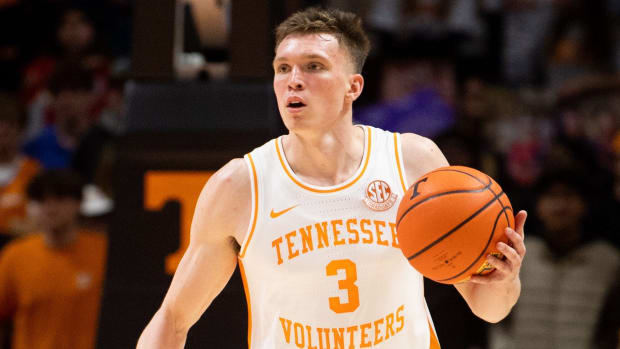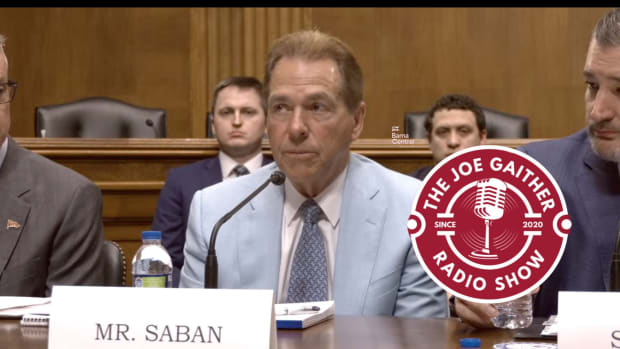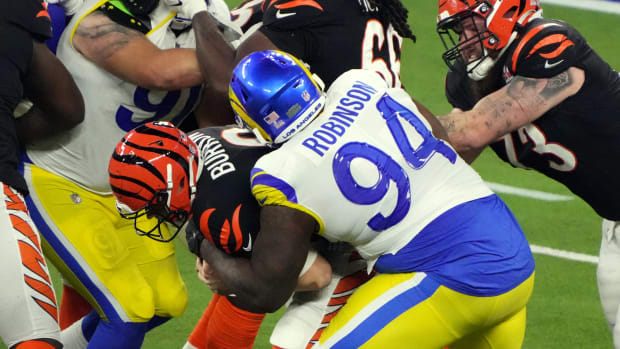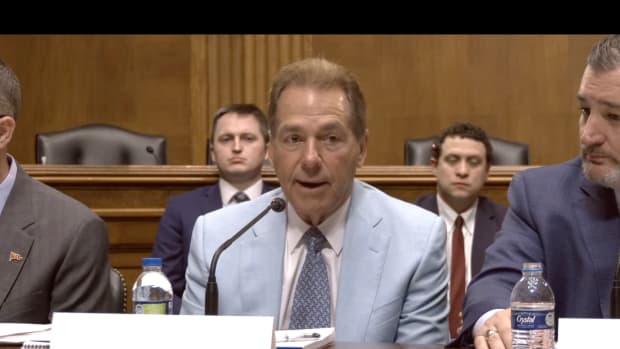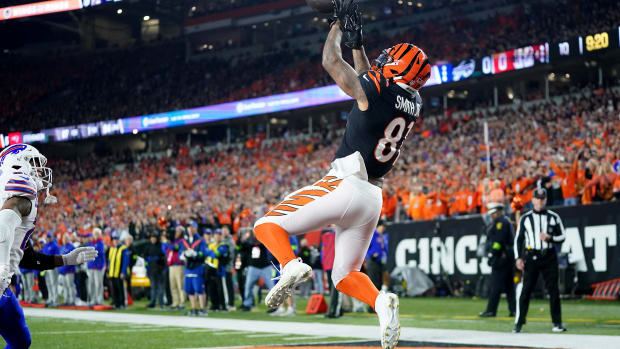Notebook: Alabama on Pace for Most Penalties of Saban Era
TUSCALOOSA, Ala. — One of the most surprising statistics with the 2019 Alabama football team is the large number of penalties this season.
The Crimson Tide has been flagged 77 times, for 734 yards, which is tied for the most in the SEC in the former, and 13th in he league in the latter.
"Sometimes we are about to get off the field and then we get a penalty and then we’ll go right back on the field," junior safety Xavier McKinney said. "I can be frustrating at times but it is what it is. It happens. In a football game, it has penalties. Things happen. We just have to go out there and try to execute better and not get penalties.”
Overall, Alabama is tied for 101st in the nation, out of 130 teams. Its 112th in penalties yards, which is reflective of so many of the infractions considered to be of the major variety.
2007 59-453
2008 57-520
2009 69-598
2010 66-490
2011 49-409
2012 54-467
2013 63-520
2014 69-562
2015 89-835
2016 86-660
2017 69-569
2018 87-796
2019 77-734*
The good news for the Crimson Tide is its trending in the right direction. The three games it had double-digits in penalties were all in the first half of the season, against South Carolina, Ole Miss and Texas A&M. Alabama only had four flags last week against Western Carolina.
However, by averaging seven penalties per game it's on pace to set a new high during the Nick Saban era regardless if Alabama makes the College Football Playoff. Also, Saturday's game at Auburn will be the toughest environment the Crimson Tide has played in all season.
“You have to control your emotions, knowing people are going to try to get under your skin and being ready for it,” junior wide receiver DeVonta Smith said.
Sugar huddles require extra prep
One of the staples of Gus Malzhan's offense is what's called sugar huddles, when the Tigers loosely do a huddle, send the wideouts out first and then essentially have the line turn around and set followed by a quick snap of the ball.
The idea is opposing defenses have no no time to adjust, plus it can be used to help disguise a trick play,
“Auburn’s a little different," senior linebacker Anfernee Jennings said. "They try to do a lot of eye-candy stuff and get your eyes going everywhere and not doing your job."
The sugar huddles may be an even a bigger concern for the defensive front seven because Auburn likes to use to it slide an offensive lineman from one side to another to create an unbalanced line. When it runs in that direction there's an an extra 300-pound blocker.
Alabama's been practicing it, but the quick tempo can be tricky by itself, never mind with all the extra bells and whistles thrown in. The key for the Crimson Tide is to make sure that a defensive play is called, even if it might be the wrong one. At least that way everyone's moving in the right direction,
"Every team finds a different way to throw something out there so I feel like we’ve seen a great deal of everything but I’m sure there’s more stuff we haven’t seen,” McKinney said.
Waddle a special-teams key
Alabama Jaylen Waddle has one priority when it comes to returns, try not to get tackled. That doesn't mean the sophomore doesn't occasionally wonder what he's doing either before turning upfield.
“It kind of hits my head about mid-play," he said. "When that hits my head I think, ‘Maybe it’s time to get up field and get some positive yards.’”
Stopping, or at least containing Waddle, figures to be high on Auburn's priority list. With 19 punt returns for 474 yards, his 24.9 averages leads the nation by a wide margin. Opponents are averaging only 29.4 net yards on punts against the Crimson Tide.
As for what Saban thinks about some of Waddle's returns, let's just say he has the same reaction as most Alabama fans. Waddle only has to image it when not going upfield.
“I could just hear him streaming, getting that good scream after going on the sidelines, so that kind of puts a little more umph in my running," he said.
Faking injuries
Although it was touched upon earlier in the Crimson Tide Roll, Saban had an interesting answer during his radio show when asked about players faking injuries to slow down defenses.
“There’s two parts to this," he responded. "First of all, when a player says he’s injured. It’s very difficult for anybody to dispute that, and you put the officials in a really, really difficult circumstance, even if a guy ... like I saw a guy do it the other [day]. He walked I mean like 20 yards across the field and then just went down, and they came out and did the trainer thing and all that and he went out of the game and they slowed the game down. But even at that, if that player says he’s injured, you cannot dispute the fact that he is or isn’t injured. Now, that’s one part of it.
“So, if a player goes down, I’m never going to dispute whether he’s injured or not injured. Is it in the spirit of the game? I don’t think so. I don’t think it’s good for the game to fake an injury if that’s in fact what somebody is doing or somebody is being told to do by a coach to slow the game down to try to create an advantage or a disadvantage. I know we want to win games, but we still have a responsibility and obligation to teach values."
Saban was just getting going, saying he gets mad at his players when they lay on the field in general.
“I tell our players, ‘If you lay on the field, you’re telling the other guy he’s kicking your [rear],' that’s what you’re telling the other guy.
“Now, I don’t ever question when a player’s hurt and I don’t tell them, I expect you to get up and run off the field no matter what. Even though when I played, I broke my ankle and my leg and ran off the field because our coach said, ‘You can’t lay on the field. You can’t let the other team know that they’re beating you. You can’t tell them that.’ So, I got up and ran off the field. Was that dumb or what? It was dumb. But I do think there’s a psychological component to all that you actually have to weigh. Is this worth doing to let the other team know that what they’re doing is actually wearing you out? So, that’s why we don’t do it."
Nevertheless, Saban went on to say that he does tell players that if they're really hurt and the offense is going fast don't try and get off the field because there's no chance to substitute.
He subsequently made the same argument as years ago when college football didn't take to slow some up-tempo offenses down.
"We create tremendous advantages for ourselves by going fast sometimes, so there’s advantage in that, no question," Saban continued. "But I do wonder sometimes if it’s in the best interest of the players that you let them go fast because guys get tired. When they get tired, they’re more apt to get injured, and when you play more plays, you’re more apt to get injured."
Tide-bits
• Saban said that one of the keys to Smith, who is listed as being 6-1, 175 pounds, is he plays a lot bigger than his size. "I think that’s something that’s always been with me, growing up always playing with older people," the wide receiver said. "I think it came naturally to me. I do try to play physical. Nobody wants to go out there and get bullied around. I know that’s true for a lot of teams, trying to see I’m not the biggest guy and they try to bully me, but I’m not going for it.”
• Xavier McKinney on Alabama's loss at Auburn in 2017: “I remember us having a bad game."
• Saban on the pros and cons of spying an opposing quarterback: “I don’t think there’s any question that there’s some advantage to it. When you rush four guys, they usually have five guys blocking. If somebody gets out of the rush lane and you have an athletic quarterback, he has a chance to move up. If you can try to fill up the rush lanes and then have somebody that when he does move, that guy’s on him provided that guy’s a good enough athlete to get him on the ground. That can be helpful, at least if you disrupt the timing and try to put somebody on him so hopefully he can’t run, which is what you’re trying to avoid. So, I think there are some real advantages to doing that. Obviously, you’re giving up a rusher when you do that, so maybe you don’t get quite as good of pressure, but it’s important that you try to design those things where somebody has a chance to break the pocket so you at least make the quarterback move off his spot early in the down so the extra guy becomes the fourth rusher.”
• Safety Jared Mayden on both he and McKinney having two interceptions against Western Carolina: "Every day, even in practice, I'm trying to match him. He's probably the best, or one of the best, safeties no matter how you look at it. Every day I look up to what he can do and what he's been doing over the last few years. He got the first two (interceptions), I was proud of him, but at the same time I'm thinking, I've got to get the next two. So when I got my first one I was like: 'X, I'm coming for you.' Then I got the second one. I feel like we both play off each other."
• One thing that everyone will be looking for from Alabama at Auburn is the sense of urgency that was lacking during the 2017 game. There's been no distraction about seeding for the College Football Playoff because the Crimson Tide is still outside looking in. "It’s easier, really," redshirt junior center Landon Dickerson said. "We’re just worrying about us right now, putting our team in the best situation. We’re really worried about this week and that’s all that we can handle right now."

